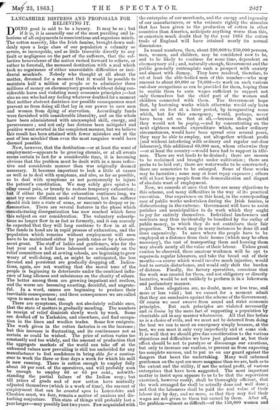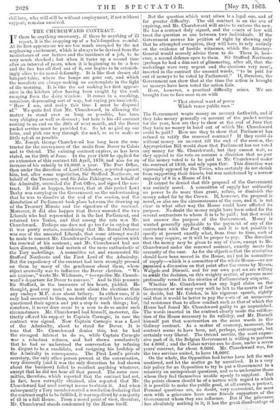LANCASHIRE DISTRESS AND PROPOSALS FOR RELIEVING IT.
DOING good is said to be a luxury. It may be so • but if it is, it is assuredly one of the most puzzling and la- borious of all enjoyments to conscientious and sagacious minds.
he cotton scarcity, like the Irish famine, brought down sud- denly upon a large class of our population a calamity so severe, so inescapable, and so little traceable directly to any fault or negligence on the part of the sufferers, that the col- lective benevolence of the nation rushed forward to relieve, or rather to forestall, the menaced destitution with a zeal which took no cognizance of either unavoidable difficulties or inci- dental mischiefs. Nobody who thought at all about the matter, dreamed for a moment that it would be possible to maintain half a million of people or to administer three millions of money on eleemosynary grounds without doing con- siderable harm and violating many economic principles ;—but also no one who had any feeling whatever doubted for a moment that neither abstract doctrines nor possible consequences must prevent us from doing all that lay in our power to save men and women from dying of starvation. Accordingly funds were furnished with considerable liberality, and on the whole have been administered with unexampled skill,, energy, and perseverance ; and not only has distress been mitigated and positive want averted in the completest manner, but we believe this result has been attained with fewer mistakes and at the -cost of less mischief than even the most sanguine would have deemed possible.
Now, however, that the destitution—or at least the want of -employment—appears to be growing chronic, or at all events seems certain to last for a considerable time, it is becoming obvious that the problem must be dealt with in a more reflec- tive and considerate manner than was originally deemed necessary. It becomes important to look a little at causes as well as to deal with symptoms, and also, as far as possible, so to deal with symptoms as not permanently to injure the patient's constitution. We may safely give opiates to allay casual pain, or brandy to restore temporary exhaustion; but if either the pain or the exhaustion continues long, we must try some different mode of treatment, lest the sufferer should sink into a state of coma, or succumb to dropsy or in- flammation. There are several features in the phase which -manufacturing disorganization has now reached which force this subject on our consideration. The voluntary subscrip- tions no longer flow in as fast as formerly, and it can scarcely .be expected that they will lone continue to flow in at all. The funds in hand are in rapid process of exhaustion, and the population which remains without employment will soon have to be maintained either by parish rates or by a Govern- ment grant. The staff of ladies and gentlemen, who for the last year and a half have laboured so assiduously on the relief committees and at sewing schools, are beginning to grow weary of well-doing, and, as might be anticipated, the less -devoted and persistent are gradually dropping off. Indica- tions, again, are not wanting that the moral tone of the people is beginning to deteriorate under the combined influ- -ence of long idleness and subsistence on the charity of others. The better among them are growing impatient and restless, and the worse are becoming exacting, deceitful, and ungrate- ful. In a word, causes are beginning to produce their inevitable consequences; and these consequences we are called -upon to meet as we best can.
There are symptoms, though not absolutely reliable ones, that the state of matters is gradually mending. The numbers in receipt of relief diminish slowly week by week. Some -are drafted off to Yorkshire, and elsewhere, and find occupa- tion in the linen and woollen trades. Some few emigrate. The work given in the cotton factories is on the increase; but this increase is fluctuating, and its continuance not as -certain as could be wished. The price of cotton varies too -constantly and too widely, and the amount of production that the aggregate markets of the world can take off at the -enhanced values now prevailing is still too undecided for any manufacturer to feel confidence in being able for a continu- .ance to work the three or four days a week for which his mill is now running. There is cotton enough to employ fully „about 50 per cent, of the operatives, and will probably soon be enough to employ 60 or 65 per cent., notwith- standing the partial failure of the Indian crop ; but till prices of goods and of raw eaten have mutually adjusted themselves (which is a work of time) the amount of -employment that can be counted upon in Lancashire and Cheshire must, we fear, remain a matter of anxious and dis- turbing conjecture. This state of things will probably last a yearlonger—may possibly last two years. Few acquainted with the enterprise of our merchants, and the energy and ingenuity of our manufacturers, or who estimate rightly the stimulus that has been given to the production of cotton in other countries than America, anticipate anything worse than this, or entertain much doubt that by the year 1865 the cotton trade of England will have attained nearly its normal dimensions.
In round numbers then, about 230,000 to 250,000 persons, men, women and Children, may be considered now to be, and to be likely to continue for some time, dependent on eleemosynary aid ; and, naturally enough, Government and the public generally contemplate such a prospect with anxiety and almost with dismay. They have resolved, therefore, to set at least the able-bodied men of this number—who may amount to about 60,000 or 70,000—to work on such various out-door occupations as can be provided for them, hoping thus to enable them to earn wages sufficient to support not only themselves but the chief part of the women and children connected with them. The Government hope that, by hastening works which otherwise would only have been set on foot at a later period, by inaugurating some which, but for this emergency, would, perhaps, never have been set on foot at all,—because though useful they would not be paying,— and by concentrating on the next eighteen months expenditure which, under ordinary circumstances, would have been spread over several years, they may be able to employ, not altogether without profit (and without interfering with ordinary and regular out-door labourers), this additional 60,000 men, whom otherwise they —or at least the country—would have had to support in idle- ness. There are wet lands to be drained ; there are mosses to be reclaimed and brought under cultivation ; there are parks to be laid out; there are waterworks to be constructed ; there are cemeteries to be enlarged. Some of these works may be lucrative ; some may at least repay expenses ; others will at least keep people from the demoralization and disgust of absolute want of employment.
Now, we concede at once that there are many objections to this scheme, and many difficulties in the way of its practical execution. Our experience on this head, in the corresponding case of public works undertaken during the Irish famine, is disheartening in the extreme. Government will have to assist parishes and municipalities to do work which they ought to pay for entirely themselves. Individual landowners and residents may thus incidentally be benefited by the outlay of public money, to which they do not contribute their fair proportion. The work may in many instances be done ill and done expensively. In cases where the people have to be employed at a distance from their homes (which may be often necessary), the cost of transporting them and housing them may absorb nearly all the value of their labour. -Unless great caution be observed, these amateur workmen will be apt to supersede regular labourers, and take the bread out of their mouths—a course which would involve much injustice, would lead to certain disturbance, and would only shift the burden of distress. Finally, the factory operatives, conscious that the work was created for them, and not obligatory or directly lucrative, would be not unlikely to perform it in a lukewarm and perfunctory manner. All these allegations are, no doubt, more or less true, and more or less valid ; but we cannot for a moment admit that they are conclusive against the scheme of the Government. Of course we must swerve from sound and strict economic principles. But such principles are violated necessarily and in limine by the mere fact of supporting a population by charitable aid in any manner whatsoever. All that lies before us is a choice of evils, and we must not be deterred from doing the best we can to meet an emergency simply because, at the best, we can meet it only very imperfectly and at some risk. It is well that we should give due consideration to the various objections and difficulties we have just glanced at, but their effect should be not to paralyze or discourage our exertions, but only to increase our caution, to prevent us from expecting too complete success, and to put us on our guard against the dangers that beset the undertaking. Many well informed gentlemen on the spot are more sanguine than we are, both as to the extent and the utility, if not the actual profit, of various enterprises that have been suggested. The most important matter to insist upon appears to us to be that the supervision exercised, however costly, shall be thoroughly efficient, that the work arranged for shall be actually done and well done ; and that the labourers shall be paid the real value of their labour day by day, and no more' so that they may feel their wages are not given to them but earned by them. After all, the problem—almost as difficult--of the 150,000 women and.
ehillren, who will still be without employment, if not without support, remains unsolved. •































 Previous page
Previous page